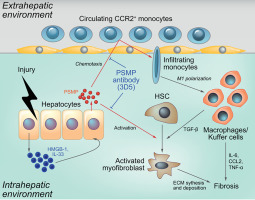当前位置:
X-MOL 学术
›
J. Hepatol.
›
论文详情
Our official English website, www.x-mol.net, welcomes your
feedback! (Note: you will need to create a separate account there.)
PSMP/MSMP promotes hepatic fibrosis through CCR2 and represents a novel therapeutic target
Journal of Hepatology ( IF 26.8 ) Pub Date : 2020-03-01 , DOI: 10.1016/j.jhep.2019.09.033 Shaoping She 1 , Xiaoning Wu 2 , Danfeng Zheng 1 , Xiaolei Pei 1 , Jing Ma 1 , Yameng Sun 2 , Jialing Zhou 2 , Lin Nong 3 , Changyuan Guo 4 , Ping Lv 5 , Quansheng Song 5 , Can Zheng 1 , Weiwei Liang 1 , Shiyang Huang 1 , Qingqing Li 1 , Zhongtian Liu 1 , Zhanming Song 1 , Yuzi Li 1 , Yu Zhang 1 , Wei Kong 6 , Hong You 2 , Jianzhong Xi 7 , Ying Wang 5
Journal of Hepatology ( IF 26.8 ) Pub Date : 2020-03-01 , DOI: 10.1016/j.jhep.2019.09.033 Shaoping She 1 , Xiaoning Wu 2 , Danfeng Zheng 1 , Xiaolei Pei 1 , Jing Ma 1 , Yameng Sun 2 , Jialing Zhou 2 , Lin Nong 3 , Changyuan Guo 4 , Ping Lv 5 , Quansheng Song 5 , Can Zheng 1 , Weiwei Liang 1 , Shiyang Huang 1 , Qingqing Li 1 , Zhongtian Liu 1 , Zhanming Song 1 , Yuzi Li 1 , Yu Zhang 1 , Wei Kong 6 , Hong You 2 , Jianzhong Xi 7 , Ying Wang 5
Affiliation

|
BACKGROUND & AIMS
C-C motif chemokine receptor 2 (CCR2) has been recognized as a promising target for the treatment of liver fibrosis. PC3-secreted microprotein (PSMP)/microseminoprotein (MSMP) is a novel chemotactic cytokine and its receptor is CCR2. In the present study we investigated the expression and role of PSMP in liver fibrosis/cirrhosis. METHODS
PSMP expression was studied in patients with fibrosis/cirrhosis and in 3 murine models of liver fibrosis, including mice treated with carbon tetrachloride (CCl4), bile-duct ligation, or a 5-diethoxycarbonyl-1,4-dihydrocollidine diet. The role of PSMP was evaluated in Psmp-/- mice and after treatment with a PSMP antibody in wild-type mice. The direct effects of PSMP on macrophages and hepatic stellate cells were studied in vitro. RESULTS
In this study, we found that PSMP was highly expressed in fibrotic/cirrhotic tissues from patients with different etiologies of liver disease and in the 3 experimental mouse models of fibrosis. Damage-associated molecular pattern molecules HMGB-1 and IL-33 induced hepatocytes to produce PSMP. PSMP deficiency resulted in a marked amelioration of hepatic injury and fibrosis. In CCl4-induced hepatic injury, the infiltration of macrophages and CCR2+ monocytes into the liver was significantly decreased in Psmp-/- mice. Consistent with the decreased levels of intrahepatic macrophages, proinflammatory cytokines were significantly reduced. Moreover, adeno-associated virus-8 vectors successfully overexpressing human PSMP in Psmp-/- mouse livers could reverse the attenuation of liver injury and fibrosis induced by CCl4 in a CCR2-dependent manner. Treatment with a specific PSMP-neutralizing antibody, 3D5, prevented liver injury and fibrosis induced by CCl4 in mice. At the cellular level, PSMP directly promoted M1 polarization of macrophages and activation of LX-2 cells. CONCLUSION
PSMP enhances liver fibrosis through its receptor, CCR2. PSMP is a potentially attractive therapeutic target for the treatment of patients with liver fibrosis. LAY SUMMARY
Our present study identifies the essential role of the protein PSMP for the development and progression of liver fibrosis in humans and mice. PSMP promotes liver fibrosis through inflammatory macrophage infiltration, polarization and production of proinflammatory cytokines, as well as direct activation of hepatic stellate cells via its receptor CCR2. A PSMP antibody can significantly reduce liver fibrosis development in vivo. These findings indicate that PSMP is a potential therapeutic target and its antibody is a potential therapeutic agent for the treatment of liver fibrosis.
中文翻译:

PSMP/MSMP 通过 CCR2 促进肝纤维化并代表新的治疗靶点
背景和目标 CC 基序趋化因子受体 2 (CCR2) 已被公认为治疗肝纤维化的有希望的靶标。PC3 分泌的微生物蛋白 (PSMP)/微精蛋白 (MSMP) 是一种新型的趋化细胞因子,其受体是 CCR2。在本研究中,我们研究了 PSMP 在肝纤维化/肝硬化中的表达和作用。方法 在纤维化/肝硬化患者和 3 个肝纤维化小鼠模型中研究 PSMP 表达,包括用四氯化碳 (CCl4)、胆管结扎或 5-二乙氧基羰基-1,4-二氢可力丁饮食治疗的小鼠。在 Psmp-/- 小鼠中和在野生型小鼠中用 PSMP 抗体处理后评估了 PSMP 的作用。体外研究了 PSMP 对巨噬细胞和肝星状细胞的直接影响。结果 在本研究中,我们发现 PSMP 在来自不同病因的肝病患者的纤维化/肝硬化组织和 3 个实验性纤维化小鼠模型中高度表达。损伤相关分子模式分子 HMGB-1 和 IL-33 诱导肝细胞产生 PSMP。PSMP 缺乏导致肝损伤和纤维化的显着改善。在 CCl4 诱导的肝损伤中,巨噬细胞和 CCR2+ 单核细胞在 Psmp-/- 小鼠肝脏中的浸润显着减少。与肝内巨噬细胞水平降低一致,促炎细胞因子显着降低。此外,在 Psmp-/- 小鼠肝脏中成功过表达人 PSMP 的腺相关病毒 8 载体可以以 CCR2 依赖性方式逆转由 CCl4 诱导的肝损伤和纤维化的减弱。用特定的 PSMP 中和抗体 3D5 治疗可防止 CCl4 在小鼠中引起的肝损伤和纤维化。在细胞水平上,PSMP 直接促进巨噬细胞的 M1 极化和 LX-2 细胞的激活。结论 PSMP 通过其受体 CCR2 增强肝纤维化。PSMP 是治疗肝纤维化患者的潜在有吸引力的治疗靶点。概述我们目前的研究确定了蛋白质 PSMP 在人和小鼠肝纤维化的发展和进展中的重要作用。PSMP 通过炎性巨噬细胞浸润、极化和促炎细胞因子的产生以及通过其受体 CCR2 直接激活肝星状细胞来促进肝纤维化。PSMP 抗体可以显着减少体内肝纤维化的发展。
更新日期:2020-03-01
中文翻译:

PSMP/MSMP 通过 CCR2 促进肝纤维化并代表新的治疗靶点
背景和目标 CC 基序趋化因子受体 2 (CCR2) 已被公认为治疗肝纤维化的有希望的靶标。PC3 分泌的微生物蛋白 (PSMP)/微精蛋白 (MSMP) 是一种新型的趋化细胞因子,其受体是 CCR2。在本研究中,我们研究了 PSMP 在肝纤维化/肝硬化中的表达和作用。方法 在纤维化/肝硬化患者和 3 个肝纤维化小鼠模型中研究 PSMP 表达,包括用四氯化碳 (CCl4)、胆管结扎或 5-二乙氧基羰基-1,4-二氢可力丁饮食治疗的小鼠。在 Psmp-/- 小鼠中和在野生型小鼠中用 PSMP 抗体处理后评估了 PSMP 的作用。体外研究了 PSMP 对巨噬细胞和肝星状细胞的直接影响。结果 在本研究中,我们发现 PSMP 在来自不同病因的肝病患者的纤维化/肝硬化组织和 3 个实验性纤维化小鼠模型中高度表达。损伤相关分子模式分子 HMGB-1 和 IL-33 诱导肝细胞产生 PSMP。PSMP 缺乏导致肝损伤和纤维化的显着改善。在 CCl4 诱导的肝损伤中,巨噬细胞和 CCR2+ 单核细胞在 Psmp-/- 小鼠肝脏中的浸润显着减少。与肝内巨噬细胞水平降低一致,促炎细胞因子显着降低。此外,在 Psmp-/- 小鼠肝脏中成功过表达人 PSMP 的腺相关病毒 8 载体可以以 CCR2 依赖性方式逆转由 CCl4 诱导的肝损伤和纤维化的减弱。用特定的 PSMP 中和抗体 3D5 治疗可防止 CCl4 在小鼠中引起的肝损伤和纤维化。在细胞水平上,PSMP 直接促进巨噬细胞的 M1 极化和 LX-2 细胞的激活。结论 PSMP 通过其受体 CCR2 增强肝纤维化。PSMP 是治疗肝纤维化患者的潜在有吸引力的治疗靶点。概述我们目前的研究确定了蛋白质 PSMP 在人和小鼠肝纤维化的发展和进展中的重要作用。PSMP 通过炎性巨噬细胞浸润、极化和促炎细胞因子的产生以及通过其受体 CCR2 直接激活肝星状细胞来促进肝纤维化。PSMP 抗体可以显着减少体内肝纤维化的发展。











































 京公网安备 11010802027423号
京公网安备 11010802027423号